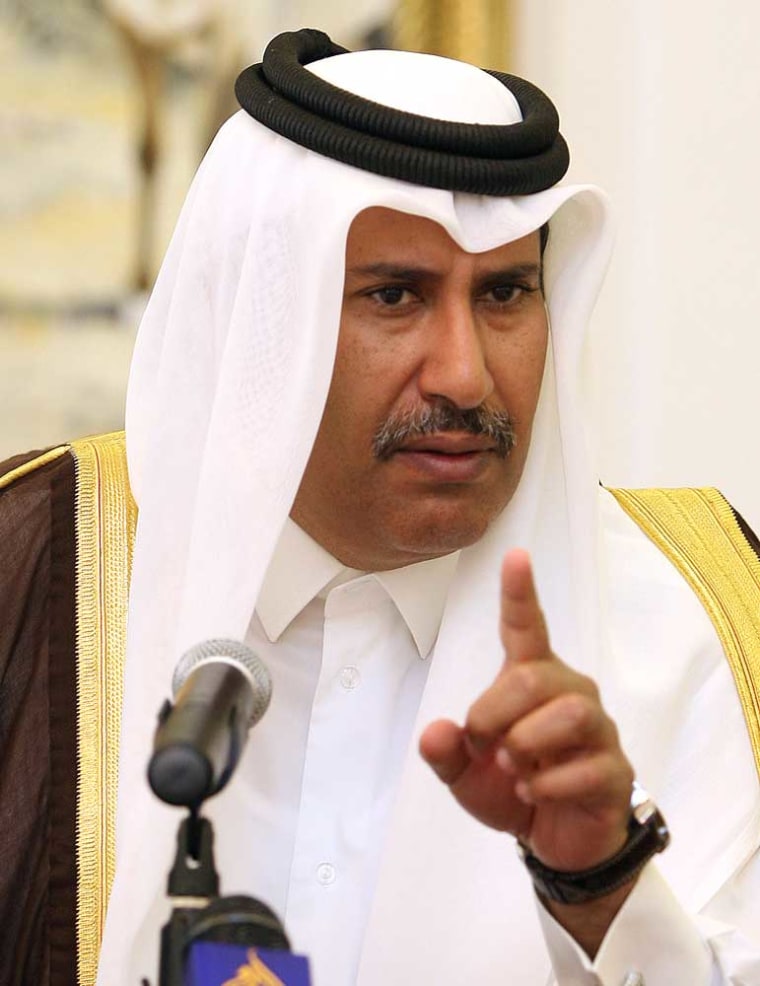Qatar became the first Arab country Monday to commit troops to monitor a tense cease-fire between Israel and Hezbollah, pledging 200 to 300 soldiers to a U.N. peacekeeping force. Pakistan’s prime minister toured devastated south Beirut and considered a similar offer.
Qatari Foreign Minister Sheik Hamad bin Jassim Al Thani said the contribution was an attempt by the tiny Persian Gulf nation “to tell the world of the Arab presence, even modestly, in this force and to tell Israel that we believe in this decision and so we want to contribute in implementing it.”
The pledge came after Sheik Hamad held talks with U.N. Secretary-General Kofi Annan in Doha.
Sheik Hamad did not say when the troops would deploy, but insisted that the peacekeeping force must have “specific and clear duties.”
Pakistani Prime Minister Shaukat Aziz — leader of another key Muslim country — was considering a similar pledge as he toured the Dahieh district of south Beirut, a Hezbollah stronghold that was pounded to rubble by Israeli missiles during the 34-day war that ended Aug. 14. Aziz was due to meet later with Lebanon’s prime minister and president.
“If it helps the settlement of peace, Pakistan may consider contributing troops to Lebanon, but such a decision has not been made yet,” the Anatolia news agency in Turkey quoted Aziz as saying. He stopped in Turkey before reaching Lebanon.
A debate over the U.N. force’s mandate and the potential dangers to peacekeeping soldiers has made countries hesitant to leap in. The planned 15,000-strong U.N. force is supposed to secure a buffer zone between Israel and the Hezbollah guerrillas in south Lebanon.
The U.S., Europe and Israel have been eager to have Muslim forces among the peacekeepers, but Muslim states fear they could be perceived as opposing Hezbollah, which gained considerable clout in the region for its fierce resistance to the Israeli army.
The U.N. cease-fire resolution calls for Hezbollah to eventually be disarmed, without specifically directing peacekeepers to take on that task.
Italian soldiers arrive
Under the cease-fire plan, 15,000 Lebanese soldiers are also to be deployed to assert control over the Hezbollah stronghold south of the Litani River and to prevent arms from reaching the guerrillas.
Largely Muslim Indonesia has announced it would send up to 1,000 soldiers by month’s end after Israel dropped objections to its participation. Indonesia and Israel do not have diplomatic relations — nor do Qatar and Israel.
In Turkey, the governing party was expected to vote this week to send troops, amid strong popular opposition.
A total of 878 Italian soldiers had reached Lebanon by Monday, Italian authorities said, with the remainder of the 1,000-strong Italian contingent arriving in the next few days.
The Italians — the first big wave of international peacekeepers — bring the total number of U.N. forces in Lebanon to 3,250, including the 2,000 troops who had been there before the fighting and 250 French troops who arrived last week.
The main arm of the French peacekeeping force is expected to arrive next week.
Israeli security officials have said they expect their army to be out of Lebanese territory within the next two weeks, providing sufficient U.N. forces have arrived in south Lebanon to enforce the truce.
Israel has not, however, specified when it intends to lift its air and sea blockade of Lebanon. Israel says it has to maintain the blockade to prevent Iran and Syria from rearming Hezbollah, but the blockade is also hindering aid and rebuilding efforts in Lebanon.
Israel unleashed its devastating assault on Lebanon after Hezbollah guerrillas seized two Israeli soldiers in a cross-border raid July 12.
Hezbollah has vowed not to lay down its weapons, and its fighters have melted away into the civilian population. The Lebanese army has made no moves to disarm the fighters.
